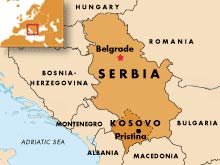Ilankai Tamil Sangam28th Year on the Web Association of Tamils of Sri Lanka in the USA |
|||
 Home Home Archives Archives |
UN Mediator Calls for Kosovo Independenceby Colum Lynch, The Washington Post, March 21, 2007
UNITED NATIONS, March 20 -- A senior U.N. mediator has proposed that U.N.-administered Kosovo be granted independence, setting the stage for a diplomatic showdown between Russia and the West over the fate of Serbia's troubled ethnic Albanian province. Martti Ahtisaari, former Finnish president and chief U.N. negotiator on Kosovo, concluded that U.N.-sponsored negotiations between Kosovo's and Serbia's leaders will never produce a settlement, and that Kosovo cannot continue under U.N. or Serbian rule. He called for a phased transition to independence, initially supervised by a European Union bureaucrat and protected by NATO forces. "The time has come to resolve Kosovo's status," Ahtisaari wrote in a confidential letter last week to U.N. Secretary General Ban Ki Moon that will be presented to the Security Council on Monday. "Independence is the only option for a politically stable and economically viable Kosovo." Kosovo has been governed by a U.N. administrator since 1999, when U.S. and European forces drove out more than 40,000 Yugoslav troops after a bloody military operation that forced more than 600,000 ethnic Albanians into exile. The United Nations had put off confronting the explosive question of Kosovo's final status for nearly eight years, citing fierce opposition by Serbia -- and its key patron, Russia -- to Kosovo's independence. But Ahtisaari and other U.N. officials say that delaying a decision on Kosovo could lead to renewed fighting between Kosovo's ethnic Albanian and Serb populations. In February, Ahtisaari outlined a detailed plan calling for an autonomous Kosovar government with the authority to sign international treaties and a commitment to respect the rights of Kosovo's Serb minority. At the time, he made no explicit reference to independence. But in a letter last week to Ban -- whose contents were first reported Tuesday by the French daily Le Monde -- Ahtisaari explicitly endorsed independence. He said a formal transition to power would be conditioned on the willingness of Kosovo's leaders to implement reforms, including one that would ensure the protection of Kosovo's Serbian minority, which has been the target of violence. Portions of the letter were read to The Washington Post. Russian concerns over the push for independence have grown increasingly vocal, with Foreign Minister Sergei Lavrov suggesting Ahtisaari be replaced with a new U.N. negotiator committed to reaching agreement between Kosovo and Serbia. And Russia's U.N. ambassador, Vitaly I. Churkin, accused the U.N. special representative for Kosovo, Joachim Rucker, of "preaching independence" to the Security Council. In an interview, Churkin said Russia does not believe that independence is "the only viable option," adding: "We do not agree that we should precipitate matters in the situation where there is disagreement among the parties." European leaders are concerned that a Russian decision to block Kosovo's drive for independence could trigger renewed violence and the prospects of large new refugee flows into Western Europe. Ethnic rioting in Kosovo in March 2004 refocused the attention of Western governments on settling Kosovo's final legal status. Many Balkans analysts have predicted for months that Ahtisaari would propose this basic plan, saying that its elements fit generally with thinking in Washington and E.U. capitals. U.S. and European diplomats say the plan represents the only viable basis for resolving the stalemate, adding that it would prevent Kosovo from unilaterally declaring independence -- a move that could undermine a smooth, internationally supervised transfer of power. But they remain divided about how to respond to a Russian veto, with some governments urging individual recognition of Kosovo's independence and others insisting that a Security Council resolution is needed. "We've been fully supportive of Ahtisaari through this process . . . and we'll support his conclusion," said Alejandro Wolff, the U.S. ambassador to the United Nations. Wolff said that the United States is not "expecting blockage" by Russia. U.N. diplomats said that the United States, Britain and France have yet to muster the nine votes needed for adoption of the resolution in the Security Council. China, Congo, Ghana, Indonesia, Peru, South Africa, Slovakia and Qatar have all expressed some reservations about independence. Richard C. Holbrooke, former president Bill Clinton's top Balkans envoy, said Russian and Serbian official have played on African and Chinese concerns that independence in Kosovo would encourage separatist movements in their regions. "These are false analogies," he said. The Russians "are playing with dynamite," Holbrooke said. "Even a delay in the approval of the Ahtisaari plan will lead to demonstrations and violence in Kosovo that will endanger the Serb minority." Staff writer Karen DeYoung in Washington contributed to this report.
| ||
